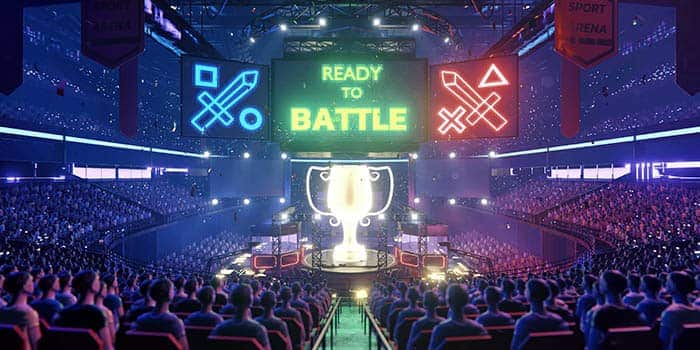- Casino
- By State
- Alabama
- Alaska
- Arizona
- Arkansas
- California
- Colorado
- Connecticut
- Delaware
- Georgia
- Florida
- Hawaii
- Idaho
- Illinois
- Indiana
- Iowa
- Kansas
- Kentucky
- Louisiana
- Maine
- Massachusetts
- Maryland
- Michigan
- Minnesota
- Mississippi
- Missouri
- Montana
- Nebraska
- Nevada
- New Hampshire
- New Jersey
- New Mexico
- New York
- North Carolina
- North Dakota
- Ohio
- Oklahoma
- Oregon
- Pennsylvania
- Rhode Island
- South Carolina
- South Dakota
- Tennessee
- Texas
- Utah
- Vermont
- Virginia
- Washington
- West Virginia
- Wisconsin
- Wyoming
- By State
- Slots
- Poker
- Sports
- Esports
Loot Boxes Increase, Expose Children to Gambling, Study Says

A study by the University of York led by David Zendle indicates that loot boxes bear more resemblance to gambling than not and contain a clear risk-reward factor.
Loot Boxes Continue to Proliferate in Video Games
Loot boxes are on the rise, a new study conducted by the University of York led by David Zendle has revealed. Even though not technically a form of gambling, the study author believes that loot boxes expose children to gambling.
The number of children participating in gambling activities has risen across the United Kingdom with 1 in 10 children aged 13-18 involved. Meanwhile, the presence of loot boxes in video games has increased from just 4% when they were first introduced to 71% in the course of nearly ten years.
According to the study, all 463 most played games on Steam, a digital marketplace for buying and playing games, have followed suite and introduced loot boxes between 2010 and 2019. The purchase of in-game items – known as microtransactions – has also increased to around 86% today from 8% previously.
A Risk-Reward Factor in Loot Boxes
The UK Gambling Commission (UKGC) has not yet categorized loot boxes as gambling, although the study suggests it should. However, the regulator did specify that estimated 2% of 11-16 year-olds can be classified as problem gamblers, based on a report published in October, 2019. Commenting on the issue, Zendle had this to say:
“A common line amongst industry representatives is that loot boxes are a niche feature in modern video games. In contrast to this, these results suggest that loot boxes have become a common presence in the lives of many gamers. In 2010, loot boxes appear to have been almost unheard of in desktop games. However, this is no longer the case.”
Specifically, Zendle explained that the majority of games on Steam already feature loot boxes. ‘Originally,’ loot boxes were popularized by a handful of video games, and perhaps Valve’s Counter-Strike and Dota 2 were among the two titles to push loot boxes, although the company did not peg achievement on microtransactions.
Loot Boxes in Numbers, Briefly
One of the companies to have been in hot water over loot boxes was Electronic Arts (EA). Star Wars Battlefront 2 featured loot boxes which offered players very little actual return, prompting EA chief executive Patrick Söderlund to issue an apology. Regardless, the concept of loot boxes goes back to Japan and has been linked to problem gambling.
Psychologists have agreed that the uncertainty in loot boxes operates as a form of gambling whereby a player feels satisfaction regardless of the outcome. According to a Juniper Research survey, estimated £23 billion were spent on loot boxes in 2018, and this number is going to nearly double by 2020.
‘Grooming Kids to Be Addicts’
Some have been more vociferous in their protest against loot boxes, including Carolyn Harris, chair of the all-party parliamentary group on gambling-related harm in parliament. As she put it, companies were:
“They’re grooming children to normalise gambling activity by encouraging speculative transactions where you don’t know what you’re going to get.”
Calls to restrict loot boxes have also been growing in the United States where Missouri Republican Josh Hawley coined “The Protecting Children From Abusive Gambling Act.”
What Happens if Loot Boxes Are Banned in the UK?
The Children’s Commissioner for England Anne Longfield is already trying to classify loot boxes as a form of gambling and tie microtransactions to a regulatory framework.
The Commissioner published a special report, Gaming the System in which children explained how they perceived loot boxes and microtransactions. As a Fortnite player put it: “You don’t want to be the one left with no skins.”
In Europe in general, loot boxes have been considered harmful and Belgium and the Netherlands have banned them. Meanwhile, there have been no serious attempt to define loot boxes as a gambling.
Should such a development come to pass, however, it would probably concern how loot boxes are used in games but not so much as ban them. However, if loot boxes are found to be a form of gambling, this would mean that any video game maker would also need to obtain a license to operate.
More Articles




